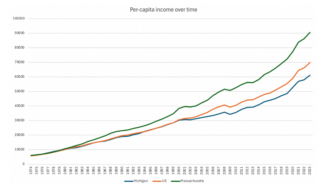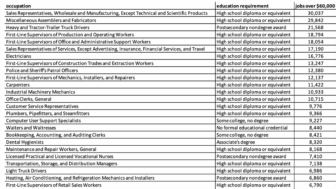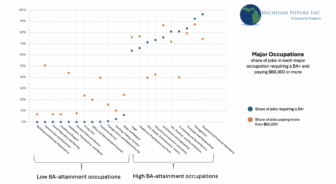Governor Whitmer’s new economic policy agenda states:

The construction of this agenda has, as a guiding principle, the idea that a primary goal of state economic policy should be rising household incomes for all Michiganders, especially those who are struggling.
This is a huge step forward in insuring that we have an economy that as it grows benefits all. As we have explored frequently that was not the case with the Michigan economy in 2019. Where even with near record lows in the unemployment rate, the Michigan Association of United Ways found that 43 percent of Michigan households could not pay for basic necessities.
Quite simply Michigan does not have a successful economy when four in ten households are struggling. We need a change in the state’s economic mission: from a low unemployment rate to rising household income for all.
Governor Whitmer gets it exactly right when her agenda states:
First, our goal is to reduce the state’s ALICE population. According to the
Michigan Association of United Ways, 43% of Michiganders are Asset Limited, Income Constrained, Employed (ALICE). These are Michiganders who work every day but struggle to pay for basic needs such as shelter, food, transportation, communication and child care. Our approach to poverty eradication will not only lift the poorest Michiganders, but will
also help stabilize the income of those who have seen their middle class status slip away because of stagnant wages and an evolving job market.
The first, and in many ways the most important, next step is for the state on a bipartisan basis to codify this change in economic mission. To make rising household income for all the state’s economic priority. This mission change was recommended last March by economic and community development leaders from across the state. Now is the time to make this fundamental mission change.
The Governor’s rising income for all agenda includes 35 specific recommendations for achieving that mission. They are in four essential areas:
- Benefits: an expanded saftey net
- Criminal Justice
- Economic: Wealth building through entrepreneurship, home ownership, employment and training
- Health, Housing and Safety
We can and should have a robust debate about the specific recommendations. Where all ideas for achieving a rising household income for all are welcome. What we shouldn’t do is aim for recreating the pre-pandemic Michigan economy. That was an economy that left too many Michigan households––many with at least one working adult––struggling to pay for basic necessities. It is far past time, that policymakers from across the ideological spectrum agree that we do not have a successful Michigan economy until and unless Michigan is a place with a broad middle class where wages and benefits allow everyone to pay the bills, save for retirement and the kids’ education, and pass on a better opportunity to the next generation.







